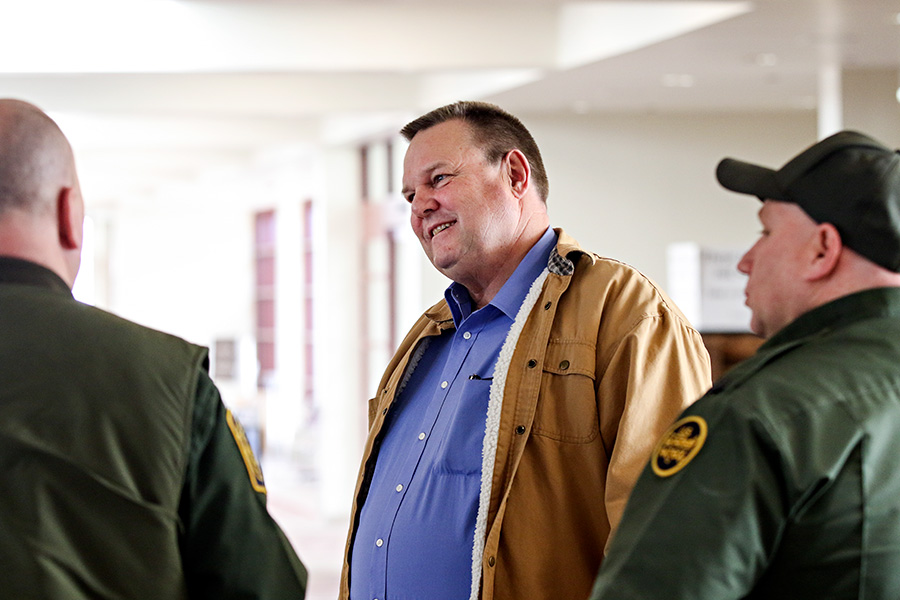Tester Fields Questions in Whitefish for Solo ‘Debate’
Montana’s senior U.S. senator appears despite Republican opponent Rosendale’s decision not to attend
By Tristan Scott
Appearing in Whitefish at what was slated to be the first debate following Montana’s June 5 primary election to select a Republican candidate in the closely watched U.S. Senate race, incumbent Democrat Jon Tester fielded questions alone after his newly minted opponent, State Auditor Matt Rosendale, opted to spend Father’s Day with his family.
Hosted by the Montana Broadcasters Association, the debate was scheduled to take place at The Lodge at Whitefish Lake the morning of June 17, moderated by Ron Davis of Butte Broadcasting. But the format was reconfigured after Rosendale begged off, citing family obligations less than a week before the debate was set to occur.
Although news organizations reported that Rosendale previously affirmed he would attend the debate, and organizers say they received verbal confirmation, Rosendale’s campaign spokesman said he made no concrete commitment.
Rosendale has since invited Tester to participate in five separate debates leading up to November’s general election, none of which have yet been scheduled.
Seated beside Davis at The Lodge during the wide-ranging conversation, Tester riffed on civility in politics, health care, campaign finance reform, gun control, border security, veterans’ affairs, drawing the ire of President Trump, and more.
Although the dust has largely settled, news about a tiff between Trump and Tester rolled across the nation in April after the president tweeted out a series of scathing critiques about Montana’s senior senator, who serves as the ranking Democrat on the Senate Veterans Affairs Committee.
Trump called on him to resign and threatened vaguely that “I know things about Tester that I could say, too, and if I said them, he’d never be elected again.”
The president’s rage was provoked by reports provided by 25 servicemen and women to Tester’s staff raising concerns about the qualifications of Ronny Jackson, Trump’s pick to lead Veterans Affairs who in 2013 was appointed to the role of White House physician under the Obama administration.
The anonymous allegations, which Tester has defended as credible and consistent, accused Jackson of abusive behavior and professional misconduct in interviews with Democratic staff on the Senate Veterans Affairs Committee, which is charged with vetting the president’s nomination.
“The president has demanded your resignation,” Davis said Sunday when bringing up the quarrel.
“Yeah, I picked up on that,” Tester said, defending his responsibility to uphold the U.S. Constitution and do his job.
Tester noted the support he received from Sen. Johnny Isakson, a Georgia Republican who chairs the Senate Veterans Affairs Committee.
“We have each other’s back on this,” Tester said.
Addressing border and homeland security, Tester, who serves as ranking member on the Homeland Security Appropriations Subcommittee, touted his work getting funds for border security in Montana, which shares a border with Canada.
Referring to border security as “critically important,” Tester was critical of the Trump administration’s practice of separating families at the border, including those seeking asylum at ports of entry.
“Being able to make people so they don’t want to come across the border, a deterrent, is important, too,” Tester said. “But a deterrent where you rip kids away from their parents is not acceptable.”
A new policy, unveiled by Attorney General Jeff Sessions in April, calls for a “zero tolerance” for immigrants who illegally enter the U.S. along the Mexican border. Sessions warned that violators would be met with “the full prosecutorial powers of the Department of Justice.”
Tester announced Sunday that he is co-sponsoring the Keeping Families Together Act, which would seek to limit the separation of families at or near ports of entry.
Seeking his third term in the U.S. Senate, Tester discussed the increasingly prominent role of big money in politics, its outsized influence and called for campaign finance reform.
During his bid to unseat Republican U.S. Sen. Conrad Burns in 2006, Tester said both candidates spent a combined $25 million. In 2012, following the landmark Citizens United case prohibiting the government from restricting independent expenditures for communications by certain corporations, the campaigns’ price tag soared to “north of $50 million,” he said.
“We’ll see what this one is,” Tester said. “But it doubled in six years, and I am not sure that when the voters went to the polls they were any more informed than before Citizens United.”
While acknowledging that the Affordable Care Act needed serious work, Tester said appealing Obamacare was not the solution. He called on leaders from both sides of the aisle to collaborate on ways to drive down costs.
“The bottom line is we need to work together, put the politics aside and come up with solutions that actually do drive down costs. And I can tell you that that was the intent of the Affordable Care Act, but it didn’t achieve that,” Tester said. “It needed work and it still needs work. But to just say we are going to repeal and take insurance away and add more instability to the system is not the way to go.”